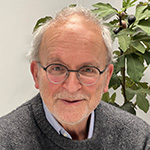Roozeboom Delivers Moore Medal Address on May 30
Pennington, NJ – The Electrochemical Society (ECS) honors Fred Roozeboom, Emeritus Professor in the Inorganic Membranes Group at Universiteit Twente, and consultant to high-tech industries, with the 2023 ECS Gordon E. Moore Medal for Outstanding Achievement in Solid State Science & Technology. He delivers his Award Address, “Moore’s Law Sustained by Non-Lithographic Technologies” at the 243rd ECS Meeting on May 30, 2023, at 0900h EDT, live at the Sheraton Boston, Room Fairfax A, in Boston, MA, and online for digital meeting attendees.
“Moore’s Law Sustained by Non-Lithographic Technologies” presents a kaleidoscopic view of Professor Roozeboom’s activities in rapid thermal processing, reactive-ion etching (RIE) etching for TSVs (through-silicon via’s), RF-SIP (radio-frequency system-in-package) integration of passives, and atomic layer processing (deposition, etch, and cleaning). In sub-10 nm scaling and fabrication of 3D architectures, especially the techniques of ALD (atomic layer deposition) and ALE (atomic layer etching) have manifested to cost-effectively bridge the record incubation time needed to bring EUV (extreme ultraviolet lithography) technology from prototype to commercial use. More importantly, these unique techniques can be used to create advanced devices in dedicated isotropic (thermal and radical-enhanced) and anisotropic (directional and ion-enhanced) processing modes. Here, energetic species (radicals and/or ions in a plasma) are used in one or more steps, with the ions yielding anisotropic profiles (used in FinFET [fin field-effect transistor] logic and 3D NAND [not-AND] memory), and neutrals and radicals yielding isotropic profiles used to deposit or etch the features in horizontal nanowires, nanosheets and “forksheets” in GAA-FETs (gate-all-around FETs).
The 243rd ECS Meeting with the 18th International Symposium on Solid Oxide Fuel Cells (SOFC-XVIII) from May 28-June 2, 2023, showcases today’s and tomorrow’s top researchers in the fields of electrochemistry and solid state science and related technologies. Symposia with over 2,000 abstracts cover 14 different topic areas: Batteries and Energy Storage; Carbon Nanostructures and Devices; Corrosion Science and Technology; Dielectric Science and Materials; Electrochemical/Electroless Deposition; Electrochemical Engineering; Electronic Materials and Processing; Electronic and Photonic Devices and Systems; Fuel Cells, Electrolyzers, and Energy Conversion; Organic and Bioelectrochemistry; Physical and Analytical Electrochemistry, Electrocatalysis, and Photoelectrochemistry; and Sensors.
The ECS Gordon E. Moore Medal for Outstanding Achievement in Solid State Science & Technology was established in 1971 as the Solid State Science and Technology Award to honor distinguished contributions to the field of solid state science and technology. In 2005, the award was renamed in honor of longtime ECS member Gordon E. Moore (1929-2023). What would become Moore’s Law—the number of transistors that would fit on a computer chip would double every year—was first articulated by Moore at a Society meeting in 1964. Four years later, he co-founded Intel Corporation, now the largest manufacturer of silicon microchips in the world. The award is presented biennially to a leader in the field nominated by the 8,000+ ECS members. Many renowned researchers have received the award since its founding, including in 1999, the 2014 Nobel Prize in Physics Laureate and ECS member, Isamu Akasaki.
Fred Roozeboom received his MSc cum laude at Universiteit Utrecht (UU) in 1976 and PhD on topics in catalysis at Universiteit Twente (UT) in 1980. He joined UT’s faculty again in 2021 after working at ExxonMobil (1980-1983); Philips Research (now NXP Research, 1983-2009); TNO Holst Centre (2009-2021); and Technische Universiteit Eindhoven (2007-2021). Prof. Roozeboom received NXP’s Bronze Invention of the Year 2007 Award and became a Research Fellow there. With TNO’s spatial processing team, he received the 2011 European Association of Research & Technology Organizations (EARTO) Innovation Award. He was elected Fellow of The Electrochemical Society in 2014 and Fellow of the American Vacuum Society in 2023. Prof. Roozeboom is now a consultant to high-tech industry, and the author or co-author of over 200 publications on chemistry and physics (h-index 42), five book chapters, 39 granted US patents, editor or coeditor of 52 conference proceedings on semiconductor processing, and Executive Editor of the open access Atomic Layer Deposition International Journal.
For more information about the 243rd ECS Meeting with the 18th International Symposium on Solid Oxide Fuel Cells (SOFC-XVIII), visit www.electrochem.org/243. Go to the ECS meeting registration webpage to register for the meeting.
The Electrochemistry Society (ECS)
The nonprofit professional Electrochemical Society has led the world in electrochemistry and solid state science and technology and allied subjects since 1902. We advance scientific theory and practice through publications, meetings, continuing education, and collaboration. Our robust global membership develops solutions to the planet’s major challenges. Scientists, engineers, and industry leaders share research at ECS biannual, co-hosted, and sponsored meetings. The ECS Digital Library on IOPscience hosts abstracts and highly peer-reviewed articles from publications, including the Journal of The Electrochemical Society (the oldest journal in its field), ECS Journal of Solid State Science and Technology, and new open access journals ECS Sensors Plus and ECS Advances.
Media Contact
The Electrochemical Society
Shannon Reed
Director of Community Relations
609.737.1902, Ext. 107
Shannon.Reed@electrochem.org


